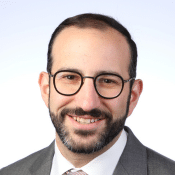Researcher Spotlight: Jordan Goldstein, MD
Leland stanford Junior University

Despite effective options for first-line treatment, many people with diffuse large B-cell lymphoma (DLBCL) still experience relapse. Novel chimeric antigen receptor (CAR) T-cell therapies are often used after relapse in DLBCL, and evidence suggests that outcomes and experiences with these treatments are best in people with lower levels of lymphoma cells. Dr. Goldstein’s work, therefore, seeks to evaluate the effectiveness and safety of CAR T-cell therapy earlier in the course of treatment for patients with residual disease after initial first-line therapy. “This strategy has the potential to improve outcomes and reduce toxicity by identifying patients, via blood test, who are highly likely to relapse and administering CAR T-cell therapy immediately after chemotherapy at a time of low tumor burden,” he explains.
Dr. Goldstein is a postdoctoral clinical fellow in hematology and oncology at Stanford University and a 2024 Lymphoma Research Foundation Scientific Mentoring Program (LSRMP) Scholar. “Early in medical school at Emory University, I developed a particular interest in blood cancers, motivated by the complex biology, range of treatments, and amazing and diverse patient population,” he says. “I was fortunate to work with an outstanding mentor who inspired me to focus on lymphoma clinical and translational research.” His commitment to lymphoma research is driven by his personal experiences with his lymphoma patients as well as family members who have been diagnosed with cancer. “These personal connections have further reinforced my belief and motivation to invest in research that can enhance our understanding of biology and treatments for lymphoma,” he says. “I dedicate myself to lymphoma research with the goal of improving outcomes for my patients and loved ones.”
With the support of the Foundation’s Clinical Career Development Award, Dr. Goldstein hopes to develop his expertise as a lymphoma researcher, focusing on using novel computational techniques to improve patient care. “I aspire to make treatment more effective and clinical trials and practice more efficient for patients,” he says.
